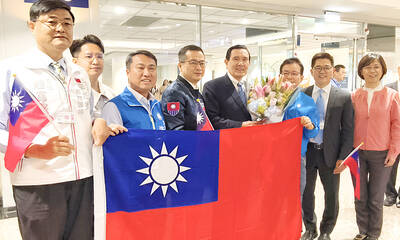A breakthrough in the manufacturing of insulation and semiconductor materials is expected to keep the nation at the forefront of IC chip fabrication, a team of researchers from National Chiao Tung University (NCTU) and Taiwan Semiconductor Manufacturing Co (TSMC) said yesterday.
The team was led by NCTU electron physics professor Chang Wen-hao (張文豪) and TSMC technology director Li Lain-jong (李連忠), previously a research fellow at Academia Sinica’s Institute of Atomic and Molecular Sciences.
The semiconductor industry has almost reached the limit of how small transistors can be, prompting researchers to search for new materials and fabrication methods, Chang told a news conference at the Ministry of Science and Technology in Taipei.
While 2D semiconductors — which have a thickness of only 0.7 nanometers, or one atom — can overcome the bottleneck caused by shrinking transistors, how to insulate them from adjacent materials is a crucial issue to solve, Chang said.
Boron nitride is the thinnest known insulator, but existing techniques cannot produce single-crystal boron nitride of sufficient high quality for wafer-scale applications, he said.
However, the team identified a way to synthesize one-atom-thick boron nitride on a wafer and demonstrated its efficiency in improving the performance of transistors made of 2D semiconductors, he said.
The key was their discovery of the underlying physics that permits boron nitride to be synthesized in single-crystal forms on a 2-inch copper wafer and then transferred to a 4-inch silicon wafer, he said.
The copper wafer is a transition material, he added.
His lab has been experimenting with growing boron nitride on copper foils for years, while Li advised the team in conducting the experiment on a wafer, Chang said.
Their paper, titled “Wafer-scale single-crystal hexagonal boron nitride monolayers on Cu (111),” was published in the scientific journal Nature on March 4.
TSMC researcher Chen Tse-an (陳則安) was listed as the paper’s lead author for making the crucial discovery about the synthesis of boron nitride.
They cannot estimate when the technique might become commercially viable, as there are still materials issues to resolve, but boron nitride is a refractory material that deserves more research, Li said.
Among the paper’s coauthors are academics from Peking University and the Chinese Academy of Sciences, who only helped characterize the team’s sample materials, Li said in response to media queries.
The ministry supported the team through its Taiwan Consortium of Emergent Crystalline Materials program, Deputy Minister of Science and Technology Shieh Dar-bin (謝達斌) said.
The NCTU-TSMC research team has set an “outstanding example of academic-industrial collaboration,” Shieh added.

Former president Ma Ying-jeou’s (馬英九) mention of Taiwan’s official name during a meeting with Chinese President Xi Jinping (習近平) on Wednesday was likely a deliberate political play, academics said. “As I see it, it was intentional,” National Chengchi University Graduate Institute of East Asian Studies professor Wang Hsin-hsien (王信賢) said of Ma’s initial use of the “Republic of China” (ROC) to refer to the wider concept of “the Chinese nation.” Ma quickly corrected himself, and his office later described his use of the two similar-sounding yet politically distinct terms as “purely a gaffe.” Given Ma was reading from a script, the supposed slipup

Former Czech Republic-based Taiwanese researcher Cheng Yu-chin (鄭宇欽) has been sentenced to seven years in prison on espionage-related charges, China’s Ministry of State Security announced yesterday. China said Cheng was a spy for Taiwan who “masqueraded as a professor” and that he was previously an assistant to former Cabinet secretary-general Cho Jung-tai (卓榮泰). President-elect William Lai (賴清德) on Wednesday last week announced Cho would be his premier when Lai is inaugurated next month. Today is China’s “National Security Education Day.” The Chinese ministry yesterday released a video online showing arrests over the past 10 years of people alleged to be

The bodies of two individuals were recovered and three additional bodies were discovered on the Shakadang Trail (砂卡礑) in Taroko National Park, eight days after the devastating earthquake in Hualien County, search-and-rescue personnel said. The rescuers reported that they retrieved the bodies of a man and a girl, suspected to be the father and daughter from the Yu (游) family, 500m from the entrance of the trail on Wednesday. The rescue team added that despite the discovery of the two bodies on Friday last week, they had been unable to retrieve them until Wednesday due to the heavy equipment needed to lift

THE HAWAII FACTOR: While a 1965 opinion said an attack on Hawaii would not trigger Article 5, the text of the treaty suggests the state is covered, the report says NATO could be drawn into a conflict in the Taiwan Strait if Chinese forces attacked the US mainland or Hawaii, a NATO Defense College report published on Monday says. The report, written by James Lee, an assistant research fellow at Academia Sinica’s Institute of European and American Studies, states that under certain conditions a Taiwan contingency could trigger Article 5 of NATO, under which an attack against any member of the alliance is considered an attack against all members, necessitating a response. Article 6 of the North Atlantic Treaty specifies that an armed attack in the territory of any member in Europe,